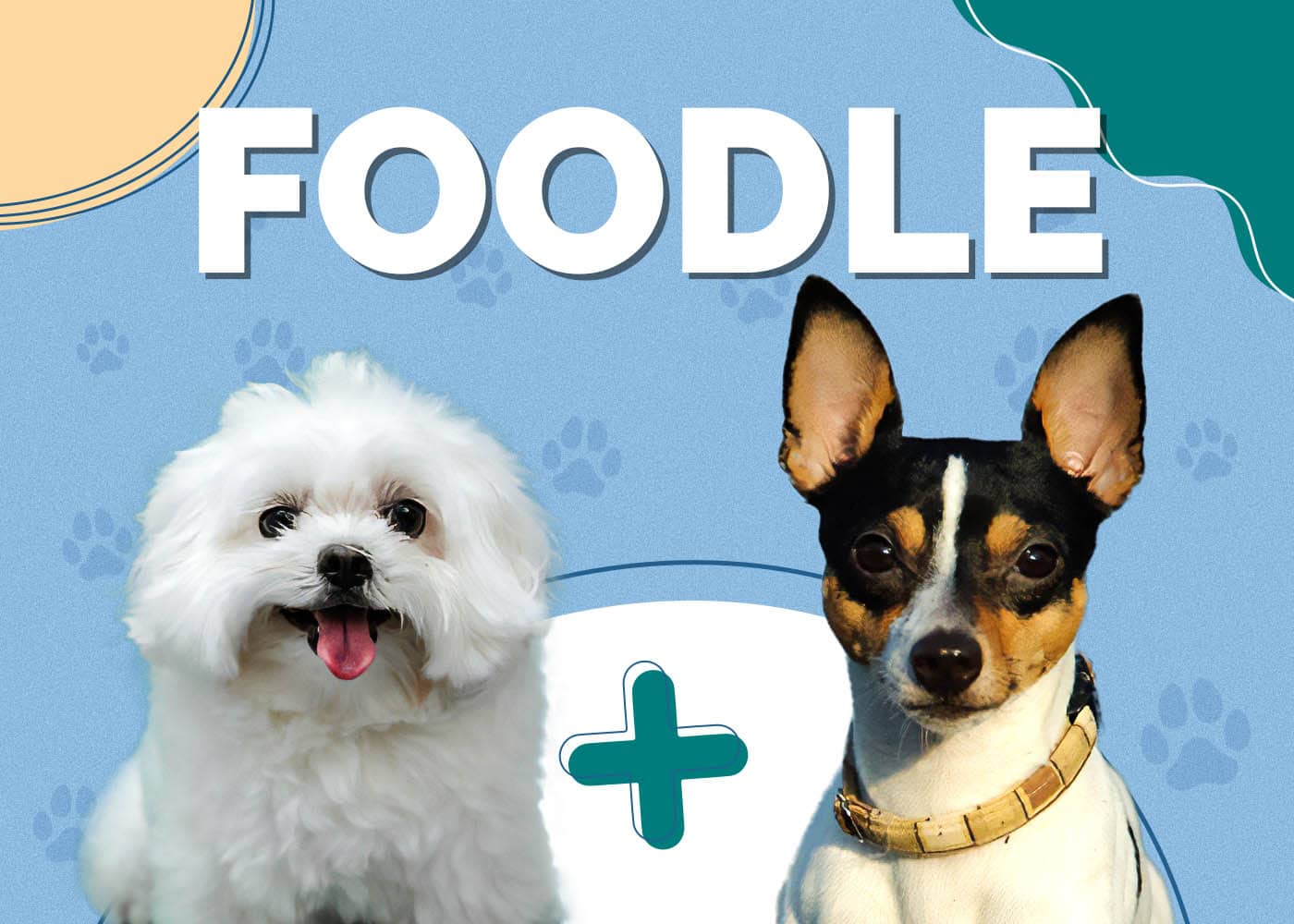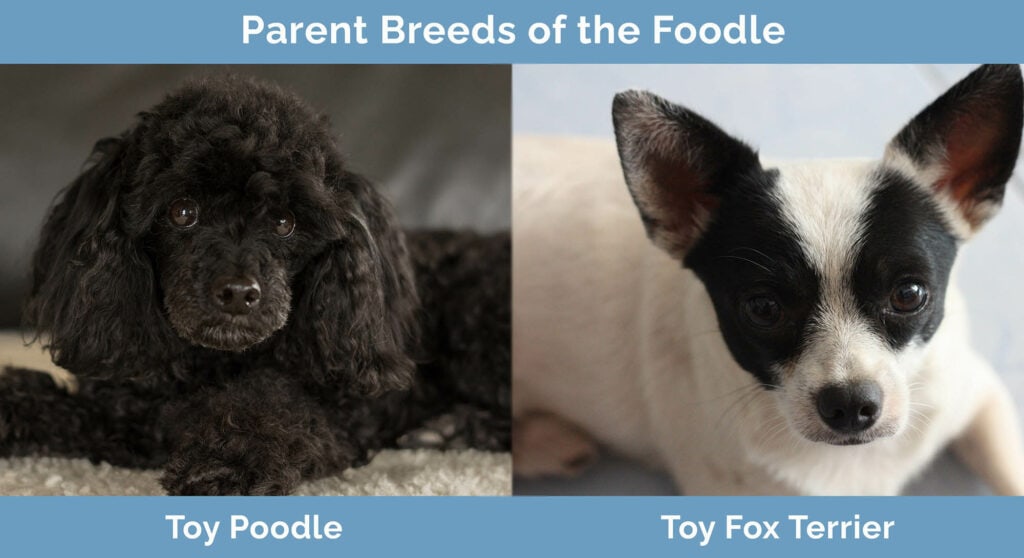Foodle (Toy Poodle & Toy Fox Terrier): Info, Pictures, Characteristics & Facts

Updated on

| Height: | 9–11 inches |
| Weight: | 4–6 pounds |
| Lifespan: | 13–15 years |
| Colors: | Black, white, tan, brown, cream, apricot |
| Suitable for: | Families with older children, considerate owners, experienced dog owners, apartment living |
| Temperament: | Feisty, fun, energetic, affectionate |
The Foodle is the puppy product of the Toy Fox Terrier and the Toy Poodle, and is this little guy cute. They are an unusual mix, but considering how popular Poodle mixes are and that dog lovers are now seeking something a little more unique compared to your traditional family favorites, we predict this guy is going to get popular.
They are sassy, full of energy, and a typical terrier character. They are great fun and will keep you on your toes. The Foodle is a toy dog that needs special considerations, and they don’t fit well with all types of families.
This means that before you commit to a Foodle, you need to make sure that they suit you and your lifestyle. Because despite being a small pooch, their personality is larger than life. And if you don’t make them happy, they will make sure that you know about it.
This breed guide is a must-read for anyone considering welcoming a Foodle into their life. So, let’s stop doodling around and jump straight into the Foodle details.
 Foodle Puppies
Foodle Puppies
The Foodle is a toy dog who needs a considerate family. They only weigh up to six pounds, and they can easily be squashed if their family doesn’t pay attention. If you are the sort of family that rough and tumble without much thought, we would suggest that you find a more robust breed.
For this reason, although they love children, they shouldn’t be placed into a home with young kids. Because they are so small, they often treat them like toys, and accidents can easily happen. Not only is this dangerous for them, but it can also be costly for their family should they suffer from any injuries.
The Foodle is also not a typical toy dog, so if you are searching for a lapdog, this is not the breed for you. Although they do love a stroke and a cuddle every night, their terrier energy means they cannot sit still for too long.
They make an excellent watchdog, which is fantastic if your doorbell is broken—but not so great if your neighbors are annoyed easily by noise. We say that they are suitable for apartment living because of their size, but you need to consider your neighbors and any noise restrictions that they might break.

Temperament & Intelligence of the Foodle 🧠
Although we mentioned earlier that Foodle is not a typical lapdog, they are not a typical terrier either. Their Toy Fox Terrier parent was bred to be a little less terrier than a Fox Terrier, and they are often described as a perfected blend of toy and terrier. This means you can expect a pooch that has an off-switch, unlike some terriers.
This is excellent news if you are looking for a boxset partner. When it is time to chill, they are also very cuddly and loving. Because they are so small, they can snuggle into the crook of your arm or lay on top of your shoulder, and you can snooze the night away.
They are fantastic fun and super bouncy, too. This guy is not shy, and they love to be the center of family attention. This guy needs lots of interactive playtime throughout the day, so you will find a game player in the Foodle for sure.
They are always on high alert, mainly for squirrels but also for strangers. They are noisy little guys, but if you like the watchdog traits that many small dogs have, this guy could be ideal for you. They are also courageous canines who will take on anything, be that a mouse, an elephant, or an intruder. Their brave personality can get them into trouble, so be sure to keep an eye on them.
The Foodle is very intelligent, but it depends on which side of their crate they got out of. If they are feeling obedient, they’ll answer your every call and heel. But if they are having a defiant, cheeky day, the only thing that you can be sure of is that they won’t take a blind bit of notice of you.
Are These Dogs Good for Families? 🏡
Yes, the Foodle makes a good family pet, but it needs a particular type of family. Because of its small stature and tiny bones, we suggest that its family has older children who know how to handle small dogs. Small children often treat them like toys, which leads to broken bones and worse.
Their ideal family would be one that can spend most of their family with them. This guy does not like to be alone, and they can suffer from severe separation anxiety. So, if your family is always out, either because of long hours at work or because you like to socialize, the Foodle is not the dog for you.
As long as you consider how barky they are, they are suitable for small apartment living. They would appreciate a little yard where he could drool over the passing squirrels, but unlike other dogs, this isn’t necessary for them. They might get lost in a large house, but they’ll stick to you like glue anyway, so this shouldn’t be an issue.
Does This Breed Get Along With Other Pets? 🐶 😽
As long as they are socialized well as pups, the Foodle will get along well with most other pets. They will get along well with other dogs and probably cats, too. But because of their ratting lineage, they will not live comfortably with pet rodents. Unless you and your pet rodents like to live life on the edge, we advise against this.
Socialization is essential here, though, and if they aren’t socialized well, there is a high chance that they will not get along well with other pets. Just like any other dog, if you are welcoming another pet into the family fold, be sure to introduce them slowly. This is to make sure that they will happily cohabit together, and it needs to be done before you make any commitments.
 Things to Know When Owning a Foodle:
Things to Know When Owning a Foodle:
Now that you know all about his personality, there are a few other things that you need to know about what he needs.
Food & Diet Requirements 🦴
The Foodle is a tiny dog with a small tummy, and this means that he only needs around one cup of food every day. This is excellent news because you will not need to spend a fortune on his monthly food bill.
Always feed them the best quality food that you can afford because nutrition is one of the easiest ways to keep them healthy. Look for a kibble that provides a well-balanced diet, including meat protein, healthy carbohydrates, fiber, omega fats, vitamins, and minerals.
Because of their tiny mouth, you’ll need to purchase a kibble designed for toy or small breeds. Although this might sound obvious, you’d be surprised just how many new toy owners have bought standard kibbles for their toy pups. Only to throw it in the bin because the biscuits are too big for their mouths.
Many smaller dogs need to eat little and often, so you can expect to feed your little Foodle three or four meals every day. This is because their stomachs are smaller, but also because they have a faster metabolism, and it helps to stabilize their blood sugars.
Exercise 🐕
The Foodle needs around 45 to 60 minutes of exercise every day. Both of their parents are high-energy dogs, but because they are the smaller toy version of their energetic parents, they don’t need as much exercise.
They will also need plenty of interactive playtime throughout the day on top of their exercise. They are a little live wire with plenty of brain energy. Be sure to invest in plenty of toys that they can play with for those times when you haven’t got too much time for playtime.
Always keep this guy on a leash because of their high prey drive. Trust us when we say you’ll struggle to get this guy back if they see something small and furry.
Training 🦮
The Foodle needs early socialization if you want them to grow up into the polite and happy pooch we all know and love. Socialization involves mixing them with other dogs to provide them with polite puppy etiquette and exposing them to new sounds, smells, sights, and environments. This will increase their confidence and make your life a whole lot easier, too.
The Foodle will inherit a stubborn streak, but thankfully, their eagerness to please will balance this trait. Ideally, you will need an awareness of how to train stubborn dogs, and novice dog owners might struggle with the Foodle.
The Foodle, being a small but feisty dog, will suffer from ‘small dog syndrome’ if you allow them to. So, you need to be fair but firm with them to avoid these spoilt behaviors. Positive reinforcement training is always the most effective way to train any dog.
Because the Foodle suffers from separation anxiety when left alone, it’s a great idea to crate-train him. Not only will this give them a safe space to relax when you do have to pop out without them, but it’ll also provide you with peace of mind knowing that they aren’t out wrecking the joint.
Grooming ✂️
The Foodle is a small dog, and so it will not take long to groom them. Because they are part Poodle, you can expect that their coat will have a slight curl.
Their coat will be medium length, and it’ll need brushing several times a week with a slicker brush to keep their curls tangle-free and smart. Matting is painful, so please keep on top of their coat. If their jacket takes after their Fox parent in that it is short and straight, they’ll need much less brushing.
Bathe them every 8 to 12 weeks. Poodles are known for their sensitive skin, so be sure to invest in a gentle shampoo, such as an oatmeal-based formula.
Their compact mouth will need cleaning several times a week with doggy toothpaste and clip their nails as soon as you can hear them tapping on the floor. Grooming is a great way to bond with your Foodle, and they will love the attention for sure.
Health and Conditions ❤️
The Foodle is a relatively healthy dog who, on average, lives between 13 to 15 years. Just like all other mixed breed dogs, they can inherit the health problems concerned with either parent. Below is a list of the most common health concerns seen in the Foodle breed.
- Hypothyroidism
- Mitral valve disease
- Patellar luxation
- Primary lens luxation
- Progressive retinal atrophy
 Male vs Female
Male vs Female
There is very little difference between a male and a female Foodle. Because the breed is so tiny, the size difference between the genders is hardly noticeable. Training and the family environment are the most influential factors on their personality rather than gender.
3 Little-Known Facts About the Foodle
1. The Foodle is not a typical toy dog.
This guy cannot sit still for too long, so they aren’t like a traditional toy dog bred to sit nicely on the laps of their owners. They have a little bit of terrier blood in them, which means lots of energy and tenacity. And, contrary to the popular parent, their Poodle parent isn’t entirely chilled either.
2. The Foodle has larger-than-life ears.
Thanks to their Toy Fox Terrier parent, they usually inherit the sky-high ears, which add to their cutesy charm.
3. The Foodle has a high prey drive.
Despite their pretty little frame and face, this guy has a super high prey drive. And because they are so light and tiny, they are as quick as a rocket. For this reason, unless you fancy wriggling into foxholes on every walk, we advise keeping them on a leash.
 Final Thoughts
Final Thoughts
The Foodle is a fun and energetic bundle of joy that fits into the palms of your hands. With their larger-than-life ears, cute button eyes, and cheeky smile, they will melt even the hardest of hearts.
If you can be around for most of their day or take them with you wherever you go, the Foodle will make for a fantastic “partner” in crime. Ideally, they need an experienced dog owner who knows how to handle their sass. As well as an older family who knows how to handle their tiny stature and be considerate of their toy needs.
Thankfully, they are easy-going canines with a real love for life. So, if you tick all of their boxes, they will be sure to tick all of yours as well.
See Also:
- Golden Mountain Dog Mixed Breed Info, Pictures, Facts, & Traits
- Teacup Yorkie Dog Breed: Info, Pictures, Personality & Facts
 Foodle Puppies
Foodle Puppies Things to Know When Owning a Foodle:
Things to Know When Owning a Foodle: Male vs Female
Male vs Female Final Thoughts
Final Thoughts








